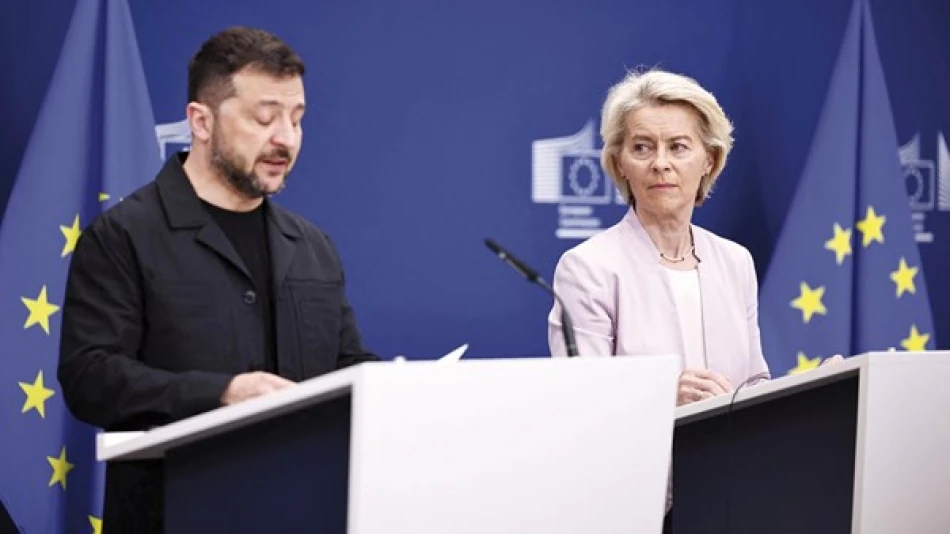
US-Ukraine Summit in Washington Today Seeks Peace Agreement
European Leaders Rally Behind Zelensky as Trump Pushes for Swift Ukraine Peace Deal
European leaders are mobilizing unprecedented diplomatic support for Ukrainian President Volodymyr Zelensky ahead of his critical meeting with Donald Trump in Washington, as the U.S. president intensifies pressure for a rapid peace agreement following his controversial Alaska summit with Vladimir Putin. The high-stakes gathering represents a pivotal moment that could reshape Europe's security architecture and determine Ukraine's territorial future after nearly three years of devastating conflict.
A United European Front Against American Pressure
German Chancellor Friedrich Merz, French President Emmanuel Macron, and British Prime Minister Keir Starmer are leading an unusual coalition of European leaders accompanying Zelensky to Washington. This coordinated show of support reflects deep European concerns about Trump's negotiating approach and echoes historical moments when European allies have had to collectively influence American foreign policy decisions.
The European delegation will also include European Commission President Ursula von der Leyen, Finnish President Alexander Stubb, and Italian Prime Minister Giorgia Meloni—a roster that spans the political spectrum but united in their determination to prevent Ukraine from being pressured into unfavorable concessions.
Learning from Past Diplomatic Disasters
European allies are particularly determined to avoid a repeat of Zelensky's last White House meeting in February, which was described as catastrophic. That experience has clearly informed their strategy of presenting a united front rather than leaving Ukraine to negotiate alone with an unpredictable American president known for his transactional approach to international relations.
Trump's Alaska Summit: A Shift in American Position
Following Trump's meeting with Putin in Alaska, the American president has notably shifted his stance on ceasefire negotiations. Initially supporting Ukraine's call for a ceasefire before peace talks, Trump now aligns with Putin's preference for direct peace negotiations—a significant concession that has alarmed European capitals.
According to sources, the Alaska discussions involved proposals for Russia to abandon small pockets of Ukrainian territory in exchange for Ukraine ceding vast areas elsewhere. Trump reportedly conveyed to Zelensky that Putin offered to freeze most front lines if Kyiv completely abandoned the industrial Donetsk region—one of Moscow's primary objectives—a proposal Zelensky firmly rejected.
The Donetsk Dilemma
Putin's demand for complete Ukrainian withdrawal from Donetsk represents more than territorial concession—it would hand Russia control over one of Ukraine's most economically valuable regions, rich in coal, steel production, and heavy industry. For Ukraine, abandoning Donetsk would mean losing approximately 15% of its pre-war industrial capacity and setting a precedent that military aggression yields permanent territorial gains.
European Red Lines and Security Guarantees
Von der Leyen has articulated clear European red lines: strong security guarantees for Ukraine, no restrictions on Ukrainian armed forces, and ensuring Ukraine has a seat at any negotiating table concerning its territory. These demands reflect lessons learned from previous failed agreements, particularly the 2014 Minsk accords that ultimately failed to prevent further Russian aggression.
The European position mirrors successful precedents like the post-World War II security architecture that prevented Soviet expansion, or more recently, the comprehensive security guarantees that enabled former Soviet states to maintain independence despite Russian pressure.
Market and Geopolitical Implications
The outcome of these negotiations will have profound implications for global energy markets, European defense spending, and international trade routes. A Ukrainian capitulation could embolden other authoritarian regimes to test Western resolve, potentially destabilizing regions from the South China Sea to the Middle East.
Conversely, a negotiated settlement that preserves Ukrainian sovereignty while providing security guarantees could establish new frameworks for resolving territorial disputes and strengthen the principle that borders cannot be changed through military force.
The Economic Stakes
Ukraine's agricultural exports, critical for global food security, and its emerging role as a renewable energy hub for Europe hang in the balance. European leaders understand that Ukrainian territorial integrity directly impacts their own energy security and economic stability—explaining their willingness to invest significant political capital in these negotiations.
A Defining Moment for Transatlantic Relations
This diplomatic confrontation represents a fundamental test of whether European influence can moderate American foreign policy decisions. Success would demonstrate Europe's ability to act as a cohesive strategic player; failure could accelerate European moves toward greater defense autonomy and reduced reliance on American security guarantees.
The coordinated European response also signals a maturation of EU foreign policy capabilities, moving beyond economic influence toward active diplomatic intervention in critical security matters. This evolution could reshape how future international crises are managed and resolved.
Most Viewed News

 Layla Al Mansoori
Layla Al Mansoori






